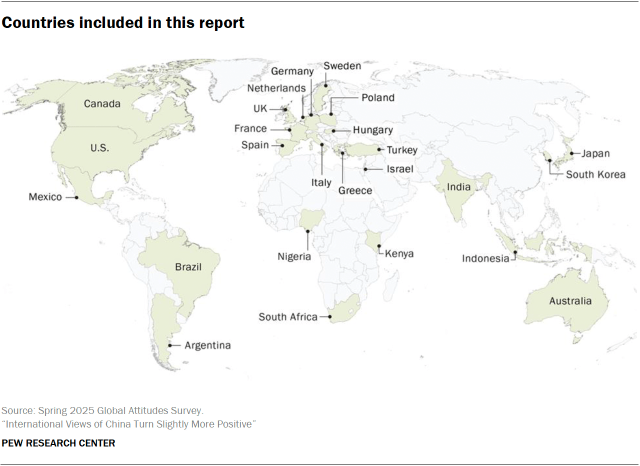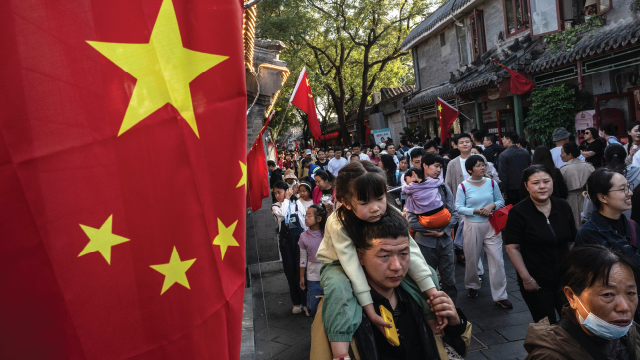
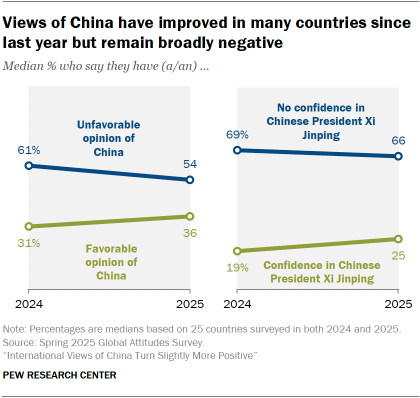
What’s a median?
On this evaluation, median scores are used to assist readers see general patterns within the information. The median proportion is the center quantity in a listing of all percentages sorted from highest to lowest.
The share of individuals with a positive view of China has elevated since final yr in 15 of the 25 nations Pew Analysis Heart surveyed this spring. In most of those nations, that is the primary time since 2020 that views of China have turned extra constructive. After the COVID-19 pandemic started, opinions of China in some locations reached historic or near-historic lows in survey information going again practically 20 years.
Confidence in Chinese language President Xi Jinping to do the appropriate factor concerning world affairs has additionally elevated in lots of nations surveyed.
Regardless of these modifications, views of China and Xi stay broadly damaging:
- A median of 36% of adults throughout the 25 nations surveyed have a positive view of China, whereas 54% have an unfavorable view.
- A median of 25% believe in Xi, in contrast with 66% who’ve little or no confidence in him.
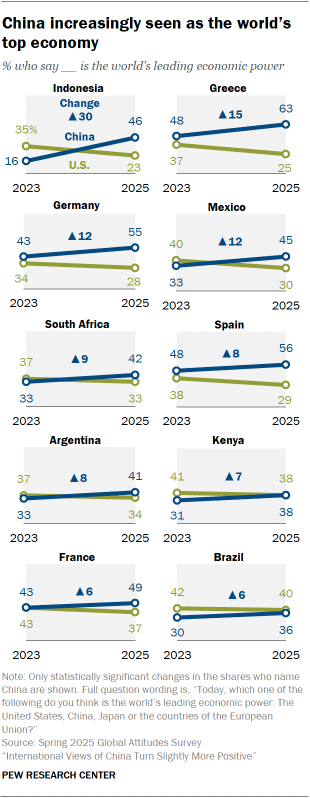
Whereas the steadiness of opinion is damaging general, views of China and Xi differ considerably throughout the nations surveyed. China and its president obtain rather more constructive marks within the 9 middle-income nations surveyed than within the 16 high-income ones.
Bounce to Chapter 3 to learn extra about views of China and Xi in middle-income nations.
Although views of China and Xi have improved in most surveyed nations since final yr, the other is true for the US and President Donald Trump. Right now, worldwide views of the 2 superpowers and their leaders are nearer than they’ve been at any level since 2020.
Associated: Views of the U.S. have worsened whereas opinions of China have improved in lots of nations
Towards this backdrop, extra individuals globally see China because the world’s main financial energy now versus once we final requested in 2023. Right now, a median of 41% of adults throughout the nations surveyed see China because the world’s prime economic system, whereas roughly the identical share (39% median) give that title to the U.S. It is a marked departure from two years in the past, when significantly extra individuals noticed the U.S. than China because the world’s main economic system.
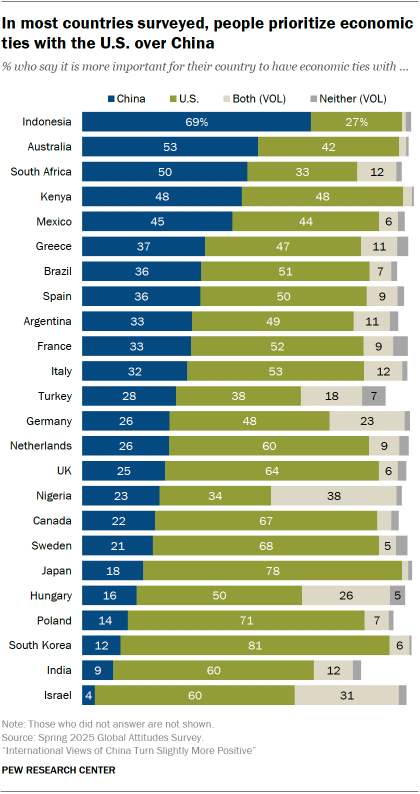
Regardless of the rising sense that China is the world’s prime economic system, individuals in practically all nations surveyed prioritize robust financial ties with the U.S. over China.
That is the case although the share of people that prioritize financial ties with China has grown in additional than half of the nations the place we’ve requested this query earlier than. In Mexico, for example, 45% of adults now say it’s extra essential for his or her nation to have robust financial ties with China than with the U.S., up from 37% in 2019 and 15% in 2015.
A few of this motion could also be associated to confidence (or insecurity) in Trump to deal with world financial issues. In most nations surveyed, individuals with much less confidence in Trump on this situation usually tend to prioritize robust financial ties with China.
These are a few of the key findings from a brand new Pew Analysis Heart survey of greater than 30,000 individuals in 25 nations carried out Jan. 8-April 26, 2025. Fieldwork in each nation besides Indonesia started after Trump’s second-term inauguration. Most interviews have been carried out earlier than Trump introduced sweeping world tariffs on April 2. Consult with Appendix A for extra data on our survey fieldwork timeline.
Attitudes towards China in middle-income nations
Our survey takes an in depth take a look at attitudes towards China, in addition to the U.S., in 9 middle-income nations.
Funding from China and the U.S.
Round half of adults or extra in practically each middle-income nation we surveyed – besides Argentina and India – see funding from China pretty much as good for his or her nation. And the share who specific this view has elevated considerably since 2019 in Turkey (+20 proportion factors), Indonesia (+18), Kenya (+11) and India (+9). It has decreased significantly in Nigeria (-18).
We additionally requested individuals about funding from the U.S. In Indonesia, Mexico, South Africa and Turkey, extra individuals describe funding from China pretty much as good for his or her nation than say the identical about U.S. funding. In contrast, individuals in India usually tend to see U.S. than Chinese language funding pretty much as good.
Issues in bilateral relations with China
Individuals in most of the middle-income nations surveyed say there are critical issues of their nation’s relationship with China. For instance, majorities throughout all 9 name the quantity of debt their nation owes to China at the least a considerably significant issue. And in Brazil, Indonesia, Kenya and Nigeria, half or extra name this a very significant issue.
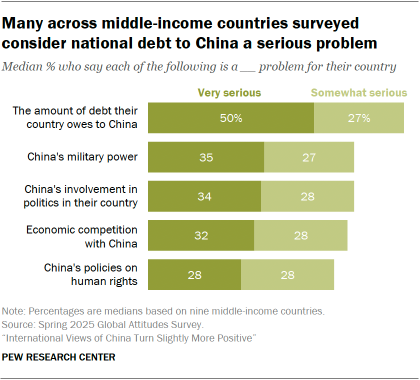
Many individuals in these nations additionally see a number of different points as problematic. These embrace China’s navy energy, its involvement of their nation’s politics, its financial competitors and its human rights insurance policies. Brazilians and Indonesians are usually particularly involved about every of those points.
Nonetheless, except India, individuals in these nations see most of the similar issues of their relations with the U.S. For instance, 65% of South Africans say U.S. insurance policies on human rights are a really or considerably significant issue; 56% say the identical about Chinese language insurance policies on human rights. (The South African survey was carried out after Trump signed an government order halting U.S. support to South Africa however earlier than a gaggle of White Afrikaners arrived within the U.S. as refugees. The survey was additionally carried out earlier than South African President Cyril Ramaphosa met with Trump on the White Home.)
Associated: How individuals in 9 middle-income nations see relations with the U.S., China
China as an ally or a risk
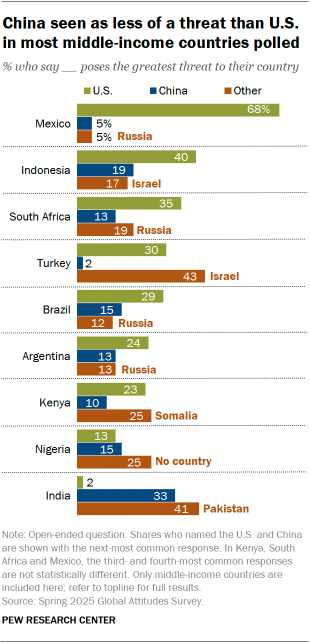
We additionally requested respondents to call (in an open-ended query) their nation’s most essential ally and best risk.
China will not be seen as the highest risk in any of the middle-income nations surveyed. The U.S., nonetheless, is essentially the most generally named risk in Argentina, Brazil, Indonesia, Mexico and South Africa – generally by a large margin.
In the meantime, South Africans and Indonesians each identify China as their nation’s prime ally.
In all three Latin American nations surveyed (Argentina, Brazil and Mexico) the U.S. is essentially the most regularly named ally.
Bounce to Chapter 4 to learn extra about views of prime allies and threats.
Associated: Individuals in Many Nations Contemplate the U.S. an Necessary Ally; Others See It as a Prime Menace

